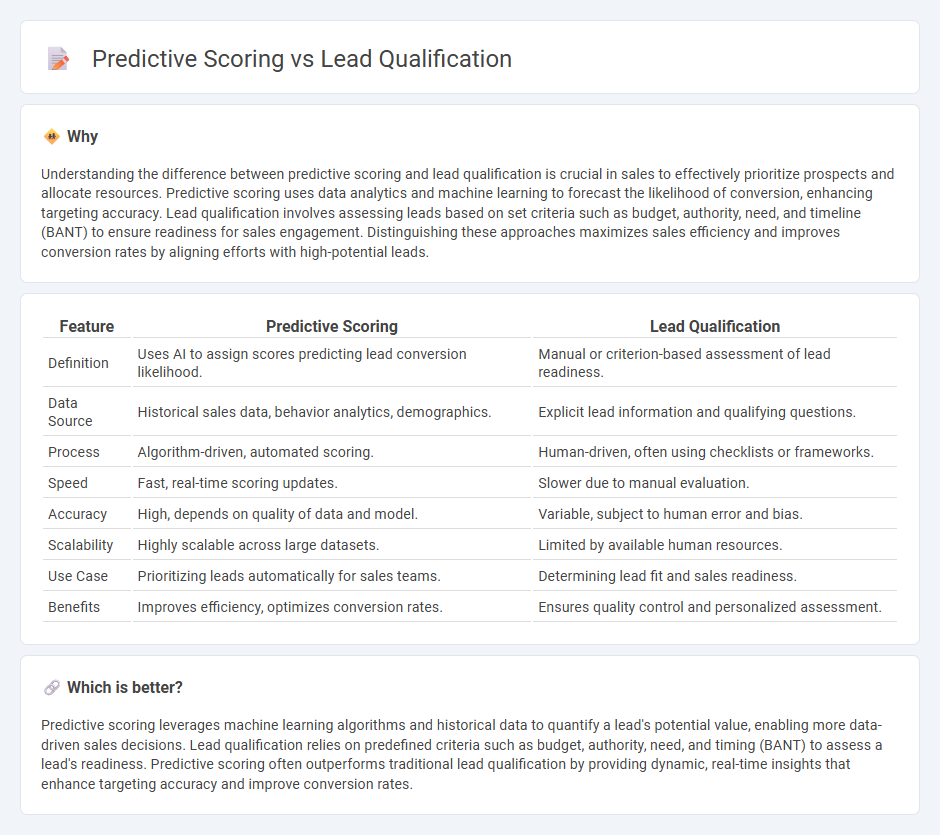
Predictive scoring uses advanced algorithms and historical data to assign numerical values indicating a lead's likelihood to convert, enhancing the accuracy of sales targeting. Lead qualification involves assessing prospects based on specific criteria such as budget, authority, need, and timeline (BANT) to determine readiness for sales engagement. Explore how integrating predictive scoring and lead qualification can boost sales efficiency and close rates.
Why it is important
Understanding the difference between predictive scoring and lead qualification is crucial in sales to effectively prioritize prospects and allocate resources. Predictive scoring uses data analytics and machine learning to forecast the likelihood of conversion, enhancing targeting accuracy. Lead qualification involves assessing leads based on set criteria such as budget, authority, need, and timeline (BANT) to ensure readiness for sales engagement. Distinguishing these approaches maximizes sales efficiency and improves conversion rates by aligning efforts with high-potential leads.
Comparison Table
| Feature | Predictive Scoring | Lead Qualification |
|---|---|---|
| Definition | Uses AI to assign scores predicting lead conversion likelihood. | Manual or criterion-based assessment of lead readiness. |
| Data Source | Historical sales data, behavior analytics, demographics. | Explicit lead information and qualifying questions. |
| Process | Algorithm-driven, automated scoring. | Human-driven, often using checklists or frameworks. |
| Speed | Fast, real-time scoring updates. | Slower due to manual evaluation. |
| Accuracy | High, depends on quality of data and model. | Variable, subject to human error and bias. |
| Scalability | Highly scalable across large datasets. | Limited by available human resources. |
| Use Case | Prioritizing leads automatically for sales teams. | Determining lead fit and sales readiness. |
| Benefits | Improves efficiency, optimizes conversion rates. | Ensures quality control and personalized assessment. |
Which is better?
Predictive scoring leverages machine learning algorithms and historical data to quantify a lead's potential value, enabling more data-driven sales decisions. Lead qualification relies on predefined criteria such as budget, authority, need, and timing (BANT) to assess a lead's readiness. Predictive scoring often outperforms traditional lead qualification by providing dynamic, real-time insights that enhance targeting accuracy and improve conversion rates.
Connection
Predictive scoring leverages data analytics and machine learning algorithms to assign a numerical value to leads based on their likelihood to convert, directly enhancing lead qualification by prioritizing high-potential prospects. Integration of predictive scoring within CRM systems refines lead qualification criteria, enabling sales teams to focus efforts on leads demonstrating behaviors and attributes indicative of successful sales outcomes. By automating lead scoring processes, organizations increase efficiency, improve forecasting accuracy, and drive higher conversion rates in sales pipelines.
Key Terms
Lead Qualification:
Lead qualification involves evaluating potential customers based on predefined criteria such as budget, authority, need, and timeline (BANT) to determine their readiness to buy. This process helps sales teams prioritize leads that are most likely to convert, improving efficiency and success rates. Explore more about how lead qualification can streamline your sales funnel and boost conversion rates.
BANT (Budget, Authority, Need, Timeline)
BANT (Budget, Authority, Need, Timeline) is a traditional lead qualification framework that assesses prospects based on their financial capacity, decision-making power, problem urgency, and purchase timeline. Predictive scoring leverages machine learning algorithms and historical data to dynamically evaluate leads, offering a data-driven complement to BANT's structured approach. Explore more to understand how integrating BANT with predictive scoring can drive higher conversion rates.
MQL (Marketing Qualified Lead)
Lead qualification identifies Marketing Qualified Leads (MQLs) based on predefined criteria such as demographic data and engagement level, ensuring alignment with target buyer personas. Predictive scoring leverages machine learning algorithms to analyze historical data patterns, providing dynamic and data-driven MQL prioritization for more accurate sales focus. Explore advanced methodologies to optimize your lead qualification and predictive scoring strategies for improved marketing ROI.
Source and External Links
The Ultimate 5 Step Lead qualification Checklist (MQL to SQL) - Lead qualification involves determining if a lead has genuine interest, need, and readiness to buy your product or service through specific questions about their goals, challenges, and willingness to engage.
What Lead Qualification Is and How It Works - Lead qualification is the process to predict lead conversion likelihood by gathering prospect data and using frameworks like BANT or MEDDIC to decide if a lead is worth pursuing.
Essential Lead Qualification Checklist for Sales Success - Artisan - Lead qualification assesses how well a prospect matches your ideal customer profile at different stages such as Marketing Qualified Leads (MQLs), Sales Accepted Leads (SALs), and Sales Qualified Leads (SQLs) with increasing rigor.
 dowidth.com
dowidth.com